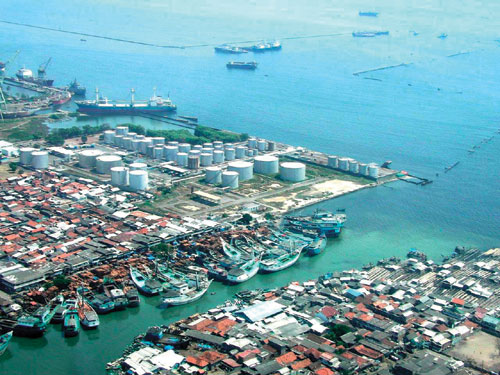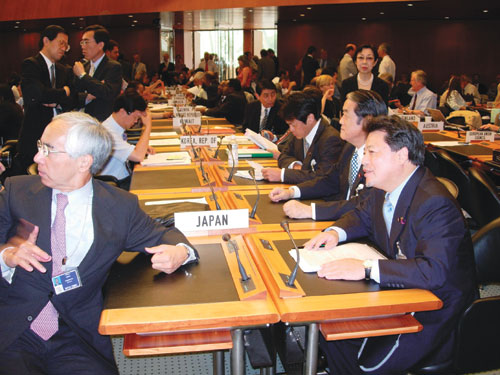Japan's Official Development Assistance White Paper 2005
Main Text > Part II ODA DISBURSEMENTS IN FISCAL YEAR 2004 > Chapter 2 Details and New Policies about Japan's ODA: Striving for Further ODA Reforms > Section 2. Measures for Each of the Priority Issues > 2.Sustainable Growth > (5) Streamlining of Trade and Investment
(5) Streamlining of Trade and Investment
Because one key to sustainable economic growth is the private sector taking on a leading role, it is important to promote the activities of the private sector, including trade and investment. However, there are a vast number of policy measures that governments of developing countries must carry out in order to develop investment environments. For many poor countries, it is difficult to resolve this issue alone. Therefore, the assistance from donor countries or based on various international frameworks is necessary. From this perspective, Japan has been providing assistance in such areas as infrastructure development, institution building, and human resources development though ODA, Other Official Flows ( OOFs ), etc.
For example, in the Greater New Delhi area, where many Japanese companies are locating their businesses, there is a chronic shortage of electricity. Therefore, in FY2004 Japan extended a yen loan to implement the North Karanpura Super Thermal Power Project (I) in order to provide a stable supply of electricity to the central and northeast regions of India, including New Delhi.
Japan also extended a yen loan to the Tanjung Priok Access Road Construction Project in Indonesia to improve access to the port of Tanjung Priok and made proposals based on development research aimed at streamlining trade procedures. In addition, Japan extended a yen loan for the Development Policy Program to further promote efforts of the Indonesian government to improve the investment environment. Furthermore, Japan is assisting Vietnam by Poverty Reduction Support Credit which incorporates reform efforts aimed at improving Vietnam's investment environment. This intends to implement the action plan which was outlined in the final report of the Japan-Vietnam Joint Initiative, whose objective is to develop Vietnam's investment environment in order to strengthen the country's competitiveness. (See also 2 (2) of this Section.)

Port of Tanjung Priok in Indonesia. Improved access to the port will also lead to improvement in the investment environment (Photo: JBIC)
To promote private investment to developing countries, it is important to enhance Public-Private Partnerships ( PPP ). From this viewpoint, to indirectly support the efforts of developing countries in promoting inward investment, Japan has been encouraging its investment in developing countries by providing investment financing that reduces the risks taken by private companies when making foreign investments and by offering public funds in such forms as investment guarantees and insurance, in addition to promoting its ODA-related efforts. Their specific examples include investment financing, bonds, and untied loans by JBIC, and overseas investment insurance and export bill insurance by Nippon Export and Investment Insurance ( NEXI ).
Trade promotion is highly significant in the development of developing countries. The World Trade Organization ( WTO ) is an international organization that works to maintain and enhance the multilateral trading system. As of the end of March 2005, the WTO has 148 member countries, approximately three-fourths of which are developing countries and 32 of which are Least Developed Countries ( LDCs ). Therefore, large discrepancies are found in trade volume and gross national income ( GNI ) among the member countries. In order to conduct trade based on a single rule — the WTO agreement — and to promote further talks on trade liberalization, various forms of cooperation are needed.
The Doha Development Agenda ( DDA ), which was launched at the Fourth WTO Ministerial Conference held in Doha, Qatar, in 2001, places emphasis on poverty reduction and sustainable growth through the participation of developing countries in the multilateral trading system. The DDA initially aimed to complete negotiations in December 2004. However, the developing and developed countries remained at odds, preventing the conclusion of an agreement at the Fifth Ministerial Conference held in Cancun, Mexico in September 2003. The subsequent DDA negotiations were brought to a temporarily standstill, but resumed course in July 2004 after the members agreed on a framework to use as the basis of future negotiations. The aim is to establish the modalities (common rules for all members related to such issues as customs duty reduction) at the Sixth Ministerial Conference in Hong Kong in December 2005, and to reach the conclusions of negotiations in 2006.
The developing countries, especially the LDCs, are faced with various difficulties in fulfilling the obligations stipulated in the WTO agreement. In light of this fact, each of the WTO agreements includes provisions on Special and Differential ( S&D ) Treatment, which allows for reduction or exemption from such obligations. Furthermore, WTO has formulated a technical cooperation plan to enhance the capacity of developing countries to execute agreements and participate in negotiations, and has been holding regional seminars and dispatching experts concerning various areas of WTO. Since the launch of DDA, Japan has extended approximately ¥260 million to the DDA Global Trust Fund, which was set up to help implement the technical assistance plan. In addition, as for bilateral efforts, Japan has implemented approximately 1,000 Trade Related Technical Assistance/Capacity Building ( TRTA/CB ) 21 projects annually in areas related to WTO agreement, as well as areas that lead to trade expansion such as the adaptation of quarantine measures and SME assistance.
In order for developing countries to improve their market access, the importance of their export capacity and competitiveness has been stressed especially through the Generalized System of Preferences ( GSP ), which adopts lower tariff rates than general rates for their exports. The promotion of duty-free, quota-free market access for the LDCs, in particular, has been an agenda not only in the trade negotiations in the WTO, but also in the arena of the United Nations ( UN ), such as the MDGs and the Programme of Action for the Least Developed Countries for the Decade 2001-2010.

Parliamentary Secretary for Foreign Affairs Fukushima (Right of photograph, close to the camera) attending the general council of the WTO
Based on the international guidelines agreed at the United Nations Conference on Trade and Development ( UNCTAD ) in 1970, Japan has been working toward the improvement of GSP since 1971. As to the efforts put forth after the launch of the DDA, since April 2003 the number of items receiving preferential treatment imported from developing countries other than LDCs has been increased by about 120. For the LDCs, approximately 200 agricultural and fishery products have been added for duty-free, quota-free treatment. As a result, roughly 93% 22 of imports from the LDCs have enjoyed duty-free, quota-free treatment in terms of volume.
When focusing particularly on the African LDCs, which account for about 60% of the 50 LDCs in the world, approximately 99% of their all exports to Japan in FY2003 23 were duty-free and quota-free in terms of volume. In this way Japan has contributed to providing access to their markets . Both at the Asia-Africa Summit in April 2005, and at the G8 Gleneagles Summit in July 2005, Prime Minister Junichiro Koizumi announced that Japan will make efforts to further expand market access for the LDCs' products in order to support their self-reliance.
Moreover, the economic partnerships that are being advanced among various countries in recent years have great significance in liberalizing trade and investment and harmonizing the economic system, which facilitates the flow of people, goods, money, and information beyond borders and contributes to the growth of all relevant countries. Therefore, the New Medium-Term Policy on ODA states Japan's intension to strategically utilize ODA to further draw out its effectiveness by supporting the development of trade and investment environments and economic infrastructures of various countries and regions, including the East Asian region with which Japan has been developing economic partnerships.
Specifically, Japan has been providing assistance in developing human resources and various systems related to trade and investment, assistance in establishing domestic legal systems related to areas such as the protection of intellectual properties and competition policies, assistance in improving enforcements and enhancing capacities in the area of customs and immigration control, and assistance in areas such as ICT, science and technology, SMEs, energy, agriculture, and tourism. As such, Japan is advancing cooperation in various areas.
Through bilateral assistance and cooperation with international agencies, Japan will continue to maintain consistency in ODA and trade policies, and actively advance cooperation toward poverty reduction and sustainable growth by promoting the participation of developing countries in the multilateral trading system and enhancing economic partnerships based on a comprehensive viewpoint of trade and development.


 Next Page
Next Page